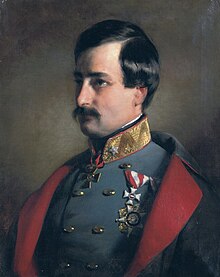Alexander Graf von Mensdorff-Pouilly Fürst von Dietrichstein zu Nikolsburg | |
|---|---|
 Portrait by Friedrich von Amerling | |
| 4th Chairman of the Austrian Ministers' Conference | |
| In office 26 June 1865 – 27 July 1865 | |
| Monarch | Francis Joseph I |
| Preceded by | Erzherzog Rainer Ferdinand von Österreich |
| Succeeded by | Richard Graf von Belcredi |
| 8th Foreign Minister of the Austrian Empire | |
| In office 27 October 1864 – 30 October 1866 | |
| Preceded by | Johann Bernhard Graf von Rechberg und Rothenlöwen |
| Succeeded by | Friedrich Ferdinand Graf von Beust |
| Personal details | |
| Born | Alexander Konstantin Albrecht Graf von Mensdorff-Pouilly 4 August 1813 Coburg |
| Died | 14 February 1871 (aged 57) |
| Spouse | Alexandrine von Dietrichstein |
| Children | Hugo, 2nd Prince von Dietrichstein zu Nikolsburg Count Albert von Mensdorff-Pouilly-Dietrichstein |
| Parent(s) | Count Emmanuel von Mensdorff-Pouilly Princess Sophie of Saxe-Coburg-Saalfeld |
Count Alexander Konstantin Albrecht von Mensdorff-Pouilly, 1st Prince von Dietrichstein zu Nikolsburg (German: Alexander Konstantin Albrecht Graf von Mensdorff-Pouilly, 1. Fürst von Dietrichstein zu Nikolsburg; 4 August 1813 in Coburg – 14 February 1871) was an Austrian general, diplomat and politician, including two years as Minister of Foreign Affairs (1864–66) and one month's service as Minister-President of Austria. He was a cousin of Queen Victoria of the United Kingdom of Great Britain and Ireland.

He was born as a son of Princess Sophie of Saxe-Coburg-Saalfeld and Count Emmanuel von Mensdorff-Pouilly, a member of the House of Mensdorff-Pouilly. He entered the Austrian army in 1829, and he was promoted to captain in 1836 and major in 1844. In 1848–49, he fought in the First Italian War of Independence and against the Hungarian Revolution of 1848. In 1849, he was promoted to colonel and the following year to major general.
In 1851, Mensdorff-Pouilly was appointed as the Austrian commissioner to Schleswig-Holstein. In 1852, he became the Austrian ambassador to Russia. He was promoted to Feldmarschallleutnant in 1858. During the Polish Uprising of 1863, he served as the governor of Austrian Galicia.
Mensdorff-Pouilly was appointed as Foreign Minister of the Austrian Empire on 27 October 1864. Mensdorff-Pouilly's policies during his tenure as Foreign Minister for Emperor Franz Joseph were often largely a continuation of the conservative traditionalism of Count Johann von Rechberg und Rothenlöwen, his predecessor.
Mensdorff-Pouilly, like Rechberg, sought to maintain conservative dominance of the German Confederation through an alliance between Austria and Prussia (in which Prussia was the junior partner), and he steadfastly refused to consider British suggestions that Austria surrender Venetia to Italy.[1]
After Austria's defeat in the Austro-Prussian War of 1866, Mensdorff-Pouilly resigned his functions in November of that year. After his resignation, he was appointed commanding general in Zagreb and Prague.
He married Alexandrine "Aline" von Dietrichstein-Proskau-Leslie (1824–1906), daughter of Joseph, 9th Prince von Dietrichstein (1798–1858), with whom he had children: